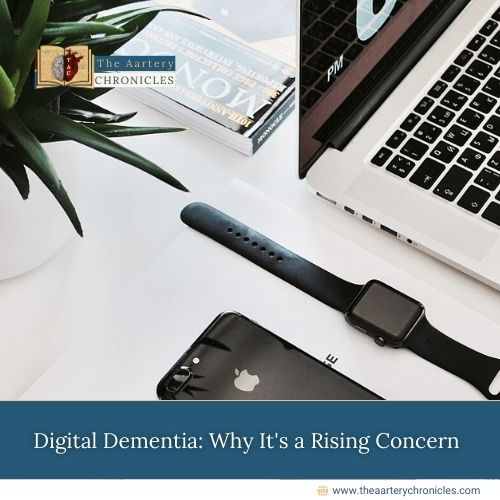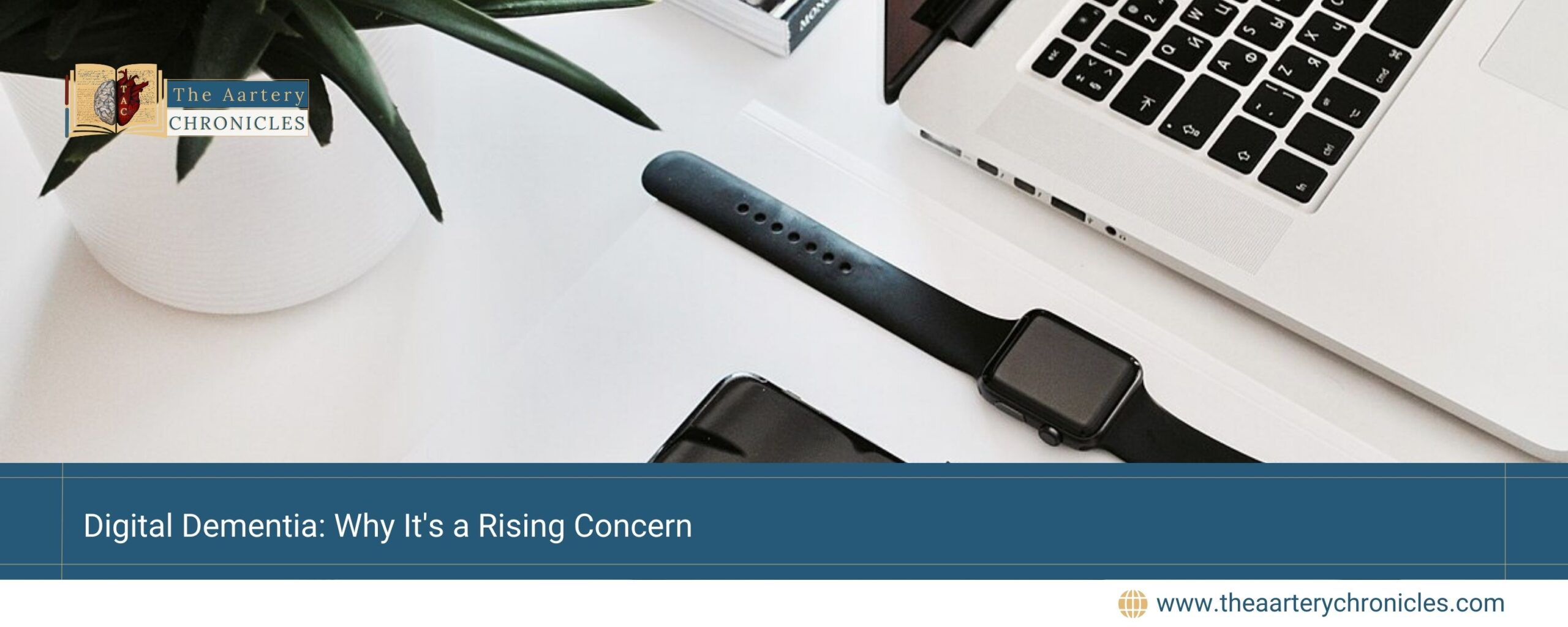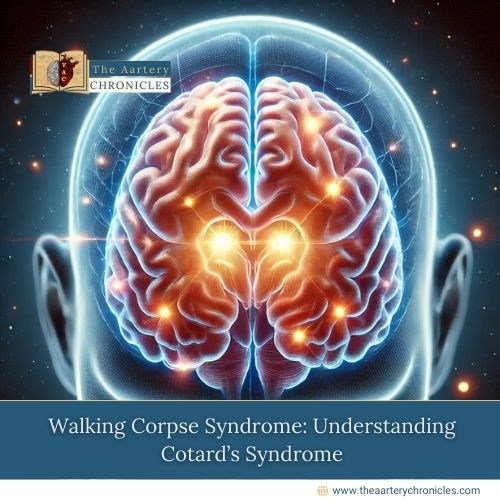

Digital Dementia: Why It's a Rising Concern
Overview
Technology, as we all know, has become an integral part of our lives, be it a smartwatch to keep track of the number of steps we walk today to the humble computer that is the basis of our work to the television aka the idiot box for recreational use to the mobile phone, that is more important to us than anything else. We are so reliant on these digital devices that we do not realize how much we are missing in life.
Additionally, sitting in one place, glued to a digital device, for longer durations, leads to many lifestyle disorders like obesity, gastrointestinal issues, and mental health degeneration, among others. There is limited physical activity and we tend to miss out on meal times, being so engrossed in the digital world. Our sleep patterns are largely affected by increased digital time. We tend to assimilate too much information at the click of a button or a left swipe, that our memory is not fully utilized.
What is digital dementia?
A study carried out in 2022 has shown that people using digital media for more than four hours per day have an elevated risk of developing vascular dementia, Alzheimer’s disease, and dementia.
Digital Dementia refers to a decrease in the cognitive abilities and memory issues faced due to over-reliance and excess exposure to digital devices like computers, tablets, smartphones, smartwatches, and television screens, by adults and children alike. The term digital Dementia was coined by Dr. Manfred Spitzer, a German neuroscientist, who warned about the excess reliance on technology which leads to cognitive disabilities similar to those observed in dementia patients.
Effects of digital dementia
We are so caught up in our digital space that we cannot pay heed to the warning bells and tend to overlook the signals that could prove detrimental in the long run. Let us see some of the effects of excessive use of digital devices that hampers our well-being, leading to digital dementia.
- Low attention span: Excessive use of digital screen time can cause lower attention spans. There is so much information available that we keep switching from one link to another, and do not seem to remember the location or the relevant information that we were searching for.
- Low memory function: We use digital devices to record our meetings, contacts, and other daily activities. Picture this – What if your smartphone dies on you and you urgently need to contact your family? Do you recall your residence number? No, because, you have saved it on your phone and you did not memorize it. After all, who memorizes phone numbers nowadays? It’s so ancient! Excessive reliance on digital devices does not utilize the entire potential of our memory, leading to low memory functioning.
- Poor brain functioning: Excessive use of digital devices means that we are not utilizing our brain power to the maximum. Our brain requires certain stimuli to function normally, and with digital devices, we are depriving our brain of the same.
- Hampers mental health: Excessive use of digital devices has a significant bearing on our mental health as well. A study shows that children who spend more than two hours each day on digital devices are more likely to face psychological issues. There are instances of children being irritable or rude if stopped from using digital devices. They may retreat from their family and shun any personal contact.
- Depression: Excessive use of digital devices can also lead to depression. Suppose you tell your child to stop using the smartphone, then there is every chance that your child may get irritated, throw tantrums, or in extreme cases get depressed. There have been instances where a child has committed suicide as his parents did not permit him to play an online game. The excess digital media addiction may lead to inculcation of vices like substance abuse, crime, alcohol addiction, and tobacco addiction.
6. Impaired learning: Excessive use of digital devices also hampers learning. Children and youth rely on the Internet for everything they learn.
- There are strained relations between the children and their families.
- There is hardly any personal one-to-one contact and therefore they cannot socialize with their family and relatives, as they are busy with their digital devices.
- Their communication skills are also poorer as they do not have to engage in conversations with their devices.
- Children may learn to speak and develop their cognitive abilities, at a much later age than normal, if not prevented from using digital devices since early childhood.
- Their willpower is also low, if they are not taught, from an early age, how to abstain from certain activities that can harm them, if done in excess.
- Certain online contents are unsuited for children viewing, but the wave of digital media makes such content easily available to children, thereby harming their thought processes and leading them towards unwanted behavior. They are unable to distinguish between good and bad and may become antisocial.

- Distractions: Excessive use of digital devices distracts us from our daily activities to a large extent. We need the TV switched on while we eat or we need to answer our emails while talking to our parents or we just “have to” answer that WhatsApp message, from our friend, while we are studying. This deprives us from enjoying the precious moments of our life.
- Anxiety: “Why is my friend not replying to my message? I can see a double blue tick; she has read the message. “How many of us have felt this? I am sure, quite a lot of us have felt this at some time or the other. These moments of suspense make us anxious and upset. I mean, maybe she is busy so she did not reply. Why should I feel so stressed for one small reply? Alas, that is how we are attuned. We tend to get anxious about trivial matters.
- Mind-body coordination: Excessive use of digital devices restricts our body movements. Just using our fingers to type or swipe does not exercise the other parts of our body. Our movements are limited to washroom breaks. Prolonged sitting hampers our posture. There is poor mind and body coordination as we are not stimulating our brain and body enough. If we have to climb up five flights of stairs, I am sure we will be tired after the first flight.
- Physical health: Excessive use of digital devices is detrimental to our physical health too. We tend to work late or use digital devices till late in the night which disturbs our sleeping patterns. Our eyes water or become dry due to excessive screen time. Our necks and shoulders become sore. Our fingers become numb from so much typing/swiping. Our shoulders hunch and we have back pain. We eat and work simultaneously thereby increasing chances of gastrointestinal issues. We eat mindlessly thereby gaining weight and becoming obese. Obesity may lead to allied illnesses like hypertension or diabetes. We tend to drink more beverages like tea, coffee, or colas to keep us going. We may feel dizzy from straining our necks too much. Overall our body goes for a toss, as they say.
Digital media addiction is on the rise, so we need to be cautious about the amount of screen time we are exposed to.
The solution is - back to basics
This is too much to digest, I know, but it is a sad prevalent fact of life! We need to revert to our basics where the elders taught the children morals and values and the importance of being a family. We need to go for family outings, visit the park or museum or movies, or anything enjoyable. We need to stop and smell the roses. Spend some time with nature to de-stress. We need to pursue our hobbies or learn something new to challenge our brains. We need to exercise and meditate for an improved body and mind. We need to laugh out loud, for no reason, but to feel happy in mind and body. We need to play board games, memory games, solve puzzles, riddles, jigsaws, and crosswords, to sharpen our brain and prevent it from rusting.
We need to bring the child in us, to life, once again. We need to socialize more meet new people and learn about their cultures. We need to invest time in reading books in the library and share our love for reading with others. We need to keep away our digital devices when we are with our family, friends, and relatives, and during meal times. We need to take a digital detox once in a while, to completely relax our mind and body. We need to reduce digital time a couple of hours before bedtime to get sound-sweet sleep. We need to take that long-awaited break now!
Finally, monitor the screen time of your children as well as the online content they are exposed to.
Know this, we have one life to live. Live it on your terms and not as a slave to digital devices. Prevent the rise of digital dementia and associated illnesses like Dementia, Alzheimer’s disease, depression, anxiety, panic attacks, and physical ill health. It is no rocket science! it is just your willpower that is required to sort you out.
Conclusion
To conclude with some precious words of wisdom from Dr. Areez N. Khoja:
“Digital dementia” refers to memory problems that can result from excessive use of digital technology, particularly by using devices like smartphones and computers.
In my view, while digital technology brings incredible convenience and access to information along with the ease of storing information on our devices, it makes us less inclined to remember things ourselves, leading to potential memory issues. In addition to this, the constant distractions from digital content can shorten our attention spans and affect our ability to focus deeply.
“Balancing digital usage with activities that stimulate the brain, like reading, physical exercise, and fostering face-to-face interactions, can help mitigate the risks associated with digital dementia.”









